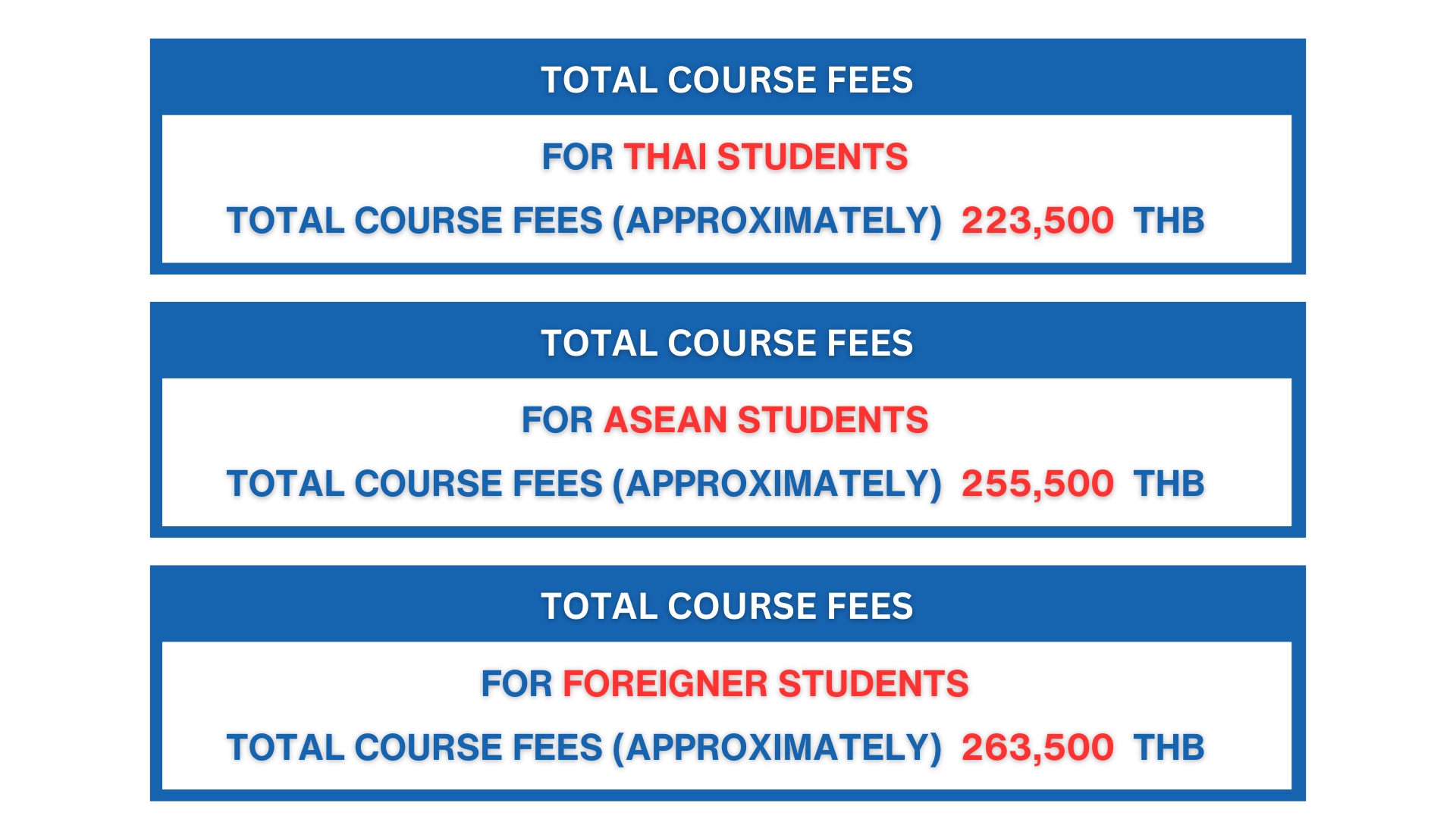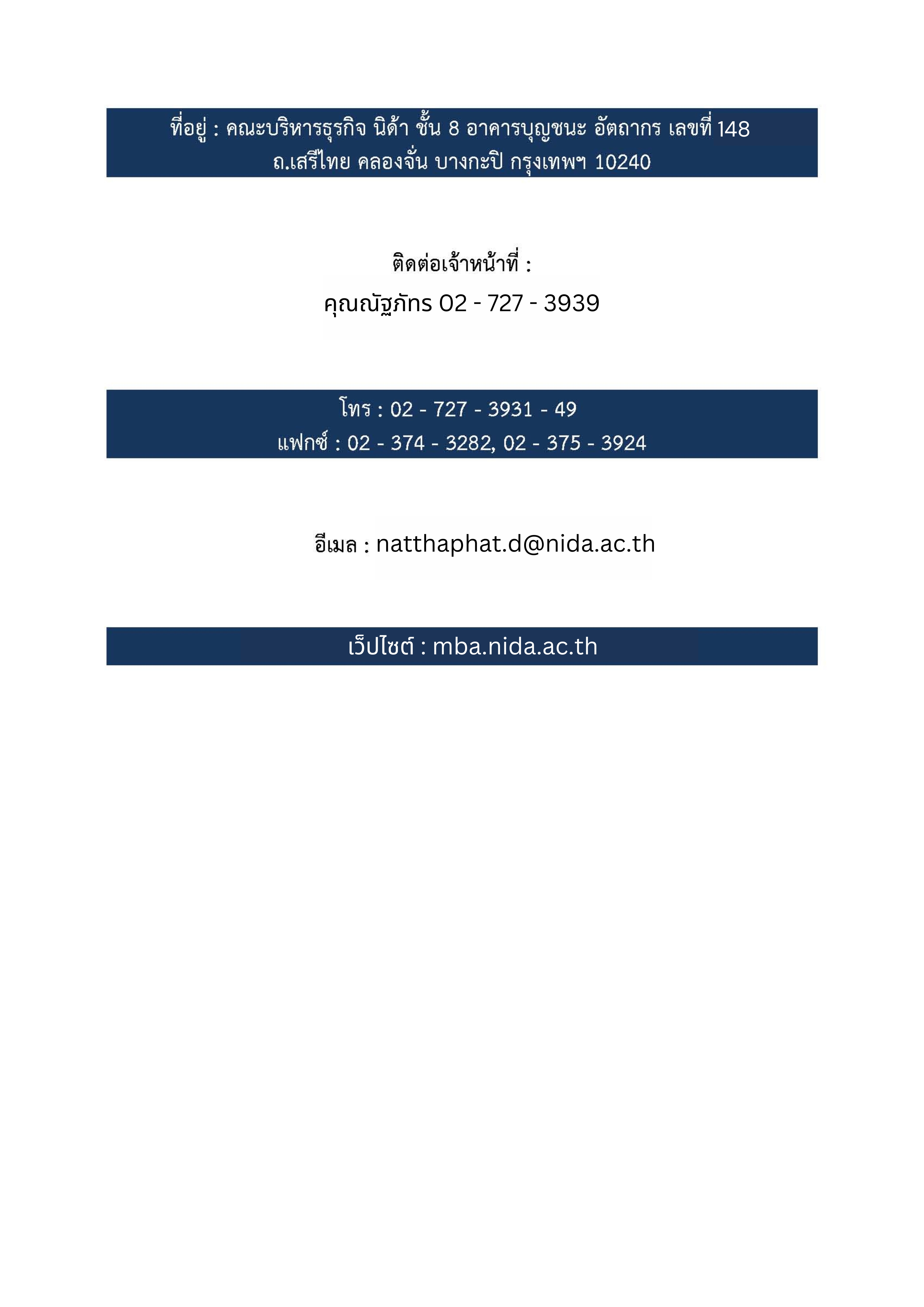
Flexible - MF
เพื่อเปิดโอกาสให้ผู้สนใจเข้าศึกษามีทางเลือกเพิ่มมากขึ้น MF เป็นหลักสูตรสำหรับผู้ที่สนใจ ซึ่งสะดวกมาเรียนทั้งในวัน-เวลาราชการ และวันเสาร์ อาทิตย์ โดยที่นักศึกษาจะสามารถเรียนบางวิชาในวัน-เวลาราชการ และบางวิชาเรียนในวันเสาร์-อาทิตย์
What: เป็นหลักสูตรทางการเงินมหาบัณฑิตภาษาไทย เหมาะสำหรับผู้ที่ต้องการคุณภาพการศึกษา จากคณะบริหารธุรกิจ นิด้า ที่ได้รับการรับรองมาตราฐานจากองค์กรระดับนานาชาติ AACSB (The Association to Advance Collegiate Schools of Business) มีปรัชญา “มุ่งผลิตมหาบัณฑิตให้มีความรู้ ความเข้าใจในหลักการและทฤษฎีทางการเงิน และสามารถนำความรู้นั้นไปประยุกต์ใช้ได้อย่างถูกต้องและเหมาะสมกอปรด้วยจรรยาบรรณทางวิชาการ จรรยาบรรณและมาตรฐานการปฏิบัติวิชาชีพ รวมทั้งมีจิตสำนึกรับผิดชอบต่อสังคมตามแนวคิดการเงินเพื่อความยั่งยืนและตอบสนองความต้องการของสังคมและประเทศชาติ”
Why : เหมาะสำหรับผู้ที่มองการณ์ไกลและไฝ่สำเร็จทางอาชีพด้านการเงิน ที่ขยายโอกาสสร้างรายได้ ด้วยการเติมเต็มศักยภาพและเพิ่มทางเลือกใหม่ๆ สู่การเป็นนักบริหารการเงินมืออาชีพ อาชีพที่สามารถประกอบได้หลังสำเร็จการศึกษา
- นักบริหารที่ปฏิบัติงานในภาครัฐ
- นักบริหารที่ปฏิบัติงานในภาคเอกชน
- นักวิชาการด้านการเงิน
- ผู้เชี่ยวชาญด้านการเงิน
- บุคลากรในหน่วยงานของรัฐหรือสถานประกอบการทางด้านการเงิน การธนาคาร
- เจ้าของธุรกิจ
- อาชีพอิสระ เช่น นักลงทุนอิสระ, อินฟลูเอนเซอร์ด้านการเงิน เป็นต้น
When :เหมาะสำหรับผู้ที่สะดวกเรียนในวัน - เวลาราชการ และเสาร์ อาทิตย์ เพื่อการศึกษาเพิ่มพูนความรู้ระดับปริญญาโท
How : สามารถเลือกเรียนเฉพาะทางตามความสนใจเพื่อเพิ่มความเชี่ยวชาญและนำไปใช้ในการการทำงานหรือเพื่อเตรียมตัวสอบประกาศนียบัตร ประกาศนียบัตรวิชาชีพทางการเงินต่างๆ CFA, FRM, CFP
โครงการ Flexible CFIRM (เรียนในเวลาราชการ และ เสาร์ อาทิตย์)
หลักสูตรวิทยาศาสตรมหาบัณฑิต
สาขาการเงินองค์กร การลงทุนและการบริหารความเสี่ยง (ภาคพิเศษ)
คณะบริหารธุรกิจ สถาบันบัณฑิตพัฒนบริหารศาสตร์
หลักสูตรวิทยาศาสตรมหาบัณฑิต สาขาวิชาการเงิน โครงการ Flexible MF
Master of Science Program in Finance (Flexible MF)
จำนวนหน่วยกิตรวมตลอดหลักสูตร 36 หน่วยกิต
.png)
Based on appropriate major or academic background, students may be
This course covers concepts and issues involved in the preparation and interpretation of financial statements, and the use of financial information to evaluate and control an organization.
The course covers financial system and financial markets, investment environment, asset classes and financial instruments, money markets, capital markets, equity markets, debt markets, international financial markets, how securities are traded, mutual funds, asset risk and returns, basic security valuation, portfolio theory and management, asset pricing models, and investment concepts and planning.
This course covers various business and finance ethics, for example, the CFA Institute Code of Ethics and Standards of Professional Conduct for investment professionals, the GARP (Global Association of Risk Professionals) Code of Conduct, and code of ethics for financial planners.
This course covers the determination of gross domestic product, an analysis of interest rate and inflation rate, and the role of fiscal and monetary policy. Furthermore, this course will extend to international economy. This course will also cover the theory of consumer choice, estimation and forecasting demand, theory of production and cost, market structure, game theory, pricing theory, theory of demand and supply of factor market, and decision-making under risk and uncertainty.
The objective of this course is to provide students with an introductory survey of many applications of descriptive and inferential statistics. Specifically, the students will be taught the fundamentals of statistical probabilities and distributions, random sampling, one-sample hypothesis testing and confidence intervals, simple and multiple linear regression, correlation analysis, analysis of variance and chi-square applications. The statistical analyses will be conducted primarily using Microsoft Excel, so students should have some familiarity with Excel.
The objective of this course is to provide students with the application of statistical and mathematical techniques to solve problems in finance. Topics included are time series versus cross-sectional data, cross-sectional versus panel data, univariate time series modeling and forecasting, a white noise process, tests of non-nested hypotheses, Wold’s decomposition theorem, the moments of an autoregressive process, and statistical versus economic or financial loss functions. In addition, the course covers selected topics in quantitative financial market analysis.
Choose 9 credits from the following courses:
This course covers the framework for financial management and corporate finance. The topics include the study of capital management, long-term asset management, short-term and long-term financing, capital structure as well as dividend policy, and cost of capital.
Choose 6 credits from the following courses:
This course covers a framework for properly valuing fixed income securities and alternative investment, the valuation frameworks in consideration of the term structure of interest rates and the value of fixed income securities with complex structures and embedded options including callable and puttable bonds, mortgage-backed securities, asset-backed securities and convertible bonds. Furthermore, the course covers methodologies for valuing interest rate futures, options on fixed income securities, and interest rate caps and floors.
This course covers an introduction to the different types of derivatives: futures, forwards, swaps and options, and the theoretical and working knowledge of derivatives analysis using mathematics as well as numerical examples in order to improve understanding in derivatives. Furthermore, this course covers the concept of risk management, the concept of trading and hedging strategies using derivatives, and the application of derivatives in risk management.
This course covers types of securities, sources and types of information used in investment analysis, methods and principles of investment decisions, and basic principles and methods of securities and portfolio management of both personal and institutional investment.
Choose core courses from one or more areas of specialization and study 12 credits. Students can select their core courses from other areas of specialization within the school or courses from the doctoral programs of graduate schools in NIDA or other universities only with approval of the Ph.D. program committee.
(1) Management
This course covers essential topics in financial and investment analysis which are crucial for financial analysts and fund managers. The topics will cut across broad areas of finance including financial accounting, financial products, quantitative analysis, portfolio management, ethics in finance, etc. The course aims to help students prepare for Chartered Financial Analyst (CFA®) Level I exam.
This course covers essential topics in financial and risk analysis which are crucial for risk analysts and risk managers. The topics include financial markets, financial products, quantitative analysis, valuation, measuring and managing risk, and investment management. The course aims to prepare students for Financial Risk Manager (FRM®) exam.
This course covers major topics that are essentials for financial advisors such as investment planning, risk and insurance planning, tax planning, income and retirement planning, and estate planning as well as education planning. It aims to help students prepare for CFP® exam.
This course covers both theoretical and conceptual tools used in investment banking, financial statement analysis, corporate valuation, equity and fixed-income underwriting business, asset securitizations, mergers and acquisitions (M&A), Leverage buyouts (LBOs), corporate restructuring, and legal and ethical and governance issues in investment banking businesses.
The course covers financial times series and their characteristics, asset prices and returns, market efficiency, the predictability of asset returns, high-frequency data analysis and market microstructure, event-study analysis, tests of asset pricing models, and portfolio study.
The main purpose of this course is to provide a basic knowledge for implementing common financial models in Excel. This course covers standard financial models in the areas of corporate finance models, portfolio management models, options pricing models, fixed income management models. In this course, the students will be provided clear and concise explanations for the implementation of the various financial models using Excel.
This course covers financial economic theory and modeling techniques as an integral part of mathematical risk management. The topics include mathematical models used for risk management and financial derivatives, the arbitrage-free principle, single-period and multi-period valuation models, valuations of exchange-traded options, application to valuation of uncertain, complete and incomplete, cash flow streams, and applications to sophisticated management of risk and insurance products.
This course covers the application of the tools used to assess financial risk. The topics include quantitative analysis, fundamental risk management concepts, financial markets and products, and valuation and risk models through a deeper understanding into market, credit, operational and integrated risk management. Furthermore, this course covers investment management as well as current market issues.
(2) Marketing
The course covers theoretical foundations of market microstructure, various types of market structures, types of traders, behavior of informed traders, price discovery, liquidity and volatility, various transaction cost measures, and empirical evidence of market microstructure in Thai and other financial markets.
This course covers the international financial environment and the problems in the management of international finance. The topics include exchange rate systems, the international money market, sources of funds for exporters, importers and international investors, management of risk caused by changes in foreign exchange rates, and management of assets, liabilities and capital structures.
This course covers the development of financial theories with emphasis on making investment decisions under risk conditions, and the development of theories on cost of capital including various models used in making financial management decisions.
This course covers problems in business finance, problems in financial management, investment planning, sources of funds, and dividends. The course will focus on the application of theories and financial techniques in problem-solving using case studies.
The topics in this course covers standard finance versus behavioral finance, utility theory, market efficiency, anomalies, limits to arbitrage, prospect theory, mental accounting, psychological biases, cognitive biases, heuristics, value versus growth investing, and momentum investing.
An Independent Study. Advanced-level investigations which cover the analysis of symptoms, problems, causes, and business audit as well as business plans which integrate various functions in businesses
คุณสมบัติของผู้สมัคร
1.1 กรณีสอบข้อเขียน
คุณสมบัติของผู้สมัครสอบข้อเขียนหลักสูตรวิทยาศาสตรมหาบัณฑิต สาขาวิชาการเงินองค์กร การลงทุนและการบริหารความเสี่ยง(Master of Science Program in Corporate Finance,Investment, and Risk Management) มีรายละเอียดดังต่อไปนี้
1.1.1 เป็นผู้สำเร็จการศึกษาระดับปริญญาตรีหรือประกาศนียบัตรเทียบเท่าปริญญาตรีจากสถาบันการศึกษาของรัฐหรือเอกชน ทั้งในและ/หรือต่างประเทศ ที่สำนักงานคณะกรรมการการอุดมศึกษา (สกอ.) รับรอง
1.1.2 มีประสบการณ์ทำงานอย่างน้อย 3 เดือน นับจนถึงวันเปิดภาคการศึกษา
หมายเหตุ ผู้สมัครที่สอบข้อเขียนผ่านแล้ว ไม่ต้องสมัครสอบสัมภาษณ์สามารถเข้าสอบสัมภาษณ์ได้ตามวันเวลาที่ระบุในประกาศผลการสอบข้อเขียนในครั้งที่สมัครสอบข้อเขียนเท่านั้น
1.2 กรณีสอบสัมภาษณ์ (เกียรตินิยม/ยื่นคะแนนสอบ)
คุณสมบัติของผู้สมัครสอบสัมภาษณ์หลักสูตรวิทยาศาสตรมหาบัณฑิต สาขาวิชาการเงินองค์กร การลงทุนและการบริหารความเสี่ยง(Master of Science Program in Corporate Finance,Investment, and Risk Management) มีรายละเอียดดังต่อไปนี้
1.2.1 เป็นผู้สำเร็จการศึกษาระดับปริญญาตรี จากสถาบันการศึกษาของรัฐบาลหรือเอกชนทั้งในประเทศและต่างประเทศที่ได้รับรองจากสำนักงาน ก.พ. และ/หรือ สำนักงานคณะกรรมการการอุดมศึกษา และมีคุณสมบัติอื่น ๆ ดังนี้
1.2.1.1 เป็นผู้สำเร็จปริญญาตรีเกียรตินิยม หรือ
1.2.1.2 มีผลการสอบข้อเขียนของภาคปกติวิชาภาษาอังกฤษและวิชาเฉพาะ 1 รวมคะแนนทั้งสองวิชาไม่ต่ำกว่า 1,100 คะแนน(แต่ละวิชาต้องมีคะแนนไม่ต่ำกว่า 500 คะแนน) โดยผลคะแนนยังไม่หมดอายุ หรือ
1.2.1.3 มีผลการสอบข้อเขียน หลักสูตรวิทยาศาสตรมหาบัณฑิต สาขาวิชาการเงินองค์กร การลงทุนและการบริหารความเสี่ยง (Master of Science Program in Corporate Finance, Investment and Risk Management) ที่มีระดับคะแนน 500 ขึ้นไป โดยผลคะแนนยังไม่หมดอายุ
1.2.2 มีประสบการณ์ทำงานอย่างน้อย 3 เดือน นับจนถึงวันเปิดภาคการศึกษา
เอกสารประกอบการสมัคร
1 ใบสมัคร คลิกเพื่อดาวโหลดใบสมัคร
2 รูปถ่าย 1 นิ้ว หน้าตรง จำนวน 2 รูป (ถ่ายมาแล้วไม่เกิน 6 เดือน)
3 สำเนาบัตรประชาชน 1 ฉบับ
4 สำเนาใบแสดงผลการศึกษา (Transcript) 1 ฉบับ (ระบุวันสำเร็จการศึกษา) สำหรับผู้ที่ศึกษาระดับปริญญาตรี หลักสูตรต่อเนื่อง 2 ปี จะต้องแนบสำเนาใบแสดงผลการศึกษา (Transcript) ระดับ อนุปริญญา (ปวส.) หรือเทียบเท่า มาด้วย 1 ฉบับ
5 สำเนาใบปริญญาบัตร หรือ หนังสือรับรอง (ฉบับสภาอนุมัติ) 1 ฉบับ
6 หนังสือรับรองการทำงาน
7 ใบเปลี่ยนชื่อ – สกุล (กรณี ชื่อ – สกุล ไม่ตรงกับหลักฐานการศึกษา)
8 หนังสือรับรองการได้ทุนสนับสนุนการศึกษาจากหน่วยงาน (ถ้ามี)
9 โครงสร้างองค์กร (Organization Structure)
10 หน้าที่ความรับผิดชอบ
11 วัตถุประสงค์ของการศึกษา (Statement of Purpose)
12 ใบรับรองผู้สมัครเป็นนักศึกษาจำนวน 2 ฉบับ ให้แนบมาพร้อมใบสมัครหรือให้ผู้รับรองส่งตรง
ไปที่ ผู้อำนวยการหลักสูตรวิทยาศาสตรมหาบัณฑิต สาขาวิชาการเงินองค์กร การลงทุนและการบริหารความเสี่ยง(Master of Science Program in Corporate Finance, Investment and Risk Management) คณะบริหารธุรกิจ สถาบันบัณฑิตพัฒนบริหารศาสตร์ เลขที่ 118 ถนนเสรี-ไทย แขวงคลองจั่น เขตบางกะปิ กรุงเทพฯ 10240 (ใบรับรองผู้สมัครสามารถยื่นพร้อมกับการสมัคร หรือ หากไม่สามารถนำมายื่นได้ในวันสมัครให้นำมายื่นที่คณะบริหารธุรกิจอย่างช้าที่สุดในวันสอบสัมภาษณ์)
13 สำเนาใบรับรองผลการทดสอบ (กรณีเป็นผู้สมัครสอบสัมภาษณ์ที่มีผลคะแนนสอบข้อเขียนที่
ยังไม่หมดอายุ แต่ถ้าเป็นผู้สำเร็จการศึกษาระดับปริญญาตรีเกียรตินิยมไม่ต้องยื่นผลการ
ทดสอบ)
สำหรับผู้สำเร็จการศึกษาจากต่างประเทศ ต้องมีเอกสารเพิ่มเติมดังนี้
14 หนังสือรับรองมาตรฐานหลักสูตรระดับปริญญาตรี ตามเกณฑ์มาตรฐานหลักสูตรของสำนักงาน คณะกรรมการการอุดมศึกษา โดยติดต่อขอได้ที่สำนักมาตรฐานและประเมินผลอุดมศึกษา สำนักงานคณะกรรมการการอุดมศึกษา
15 หนังสือรับรองการสำเร็จการศึกษาจากสถานศึกษา โดยให้สถาบันการศึกษาส่งหนังสือรับรอง โดยตรงที่
Educational Service Division,
National Institute of Development Administration
148 Serithai Road, Klong Chan,
Bangkapi, Bangkok 10240, Thailand
ทั้งนี้ : เอกสารตามข้อ 14 และ 15 สถาบันอนุโลมให้ส่งได้ถึงวันเปิดภาคการศึกษา มิฉะนั้น จะถือว่าเอกสารการขึ้นทะเบียนไม่ครบถ้วน และอาจหมดสภาพการเป็นนักศึกษาของสถาบัน
การพิจารณาคัดเลือก
1.สอบข้อเขียน
ข้อสอบข้อเขียนจำนวน 70 ข้อ (ข้อสอบแบบปรนัย) ใช้เวลาทำข้อสอบ 2 ชั่วโมง
แบ่งเป็น 1.1 ข้อสอบวิชาคณิตศาสตร์มีจำนวน ทั้งหมด 30 ข้อ
1.2 การวิเคราะห์และใช้เหตุผล 20 ข้อ
1.3 ภาษาอังกฤษ 20 ข้อ
2.พิจารณาจากใบสมัครและเอกสารประกอบการสมัคร
3.สอบสัมภาษณ์
หมายเหตุ :
- การคัดเลือกผู้สมัคร เข้าศึกษาต่อในหลักสูตร อยู่ในดุลยพินิจของคณะกรรมการประจำหลักสูตร และคณะกรรมการรับนักศึกษาของสถาบัน โดยการพิจารณาตัดสินของคณะกรรมการดังกล่าว ถือเป็นที่สุด
- กรณีที่หลักสูตร/สาขาวิชา/สาขาวิชาเอกใดๆ คัดเลือกนักศึกษาได้ต่ำกว่าจำนวนที่กำหนด สถาบันฯ ขอสงวนสิทธิ์ที่จะไม่เปิดสอนในหลักสูตร/สาขาวิชา/สาขาวิชาเอกนั้นๆ โดยผู้สมัครจะฟ้องร้องเอาความสถาบันฯ ไม่ได้


| Schedule | Round 1 |
|
Writing exam application |
Admission Closed |
|
Online Application |
Admission Closed |
|
Interview Exam Announcement |
Admission Closed |
|
Announce the location for writing examination |
To be announced |
|
Writing examination date |
To be announced |
|
Announce results of writing examination |
To be announced |
|
Announce the name of the interview |
To be announced |
|
Interview test |
To be announced |
|
Announcement of selection |
To be announced |
|
Get registration document / registration |
To be announced |
|
Registration payment |
To be announced |
|
Intensive Course |
To be announced |
|
Orientation |
To be announced |
|
Beginning of semester |
To be announced |
|
Examination Fee |
1,200 THB |
|
Tuition Fee |
167,600 THB |
|
Duration of course |
1.5 years |
|
studying time |
- Mon to Fri |
|
Language conduction |
Thai |
Application Announcement







